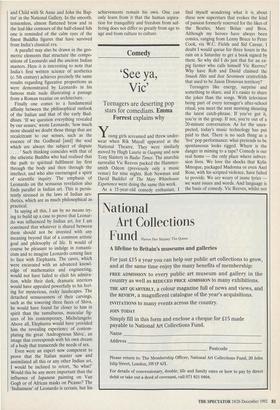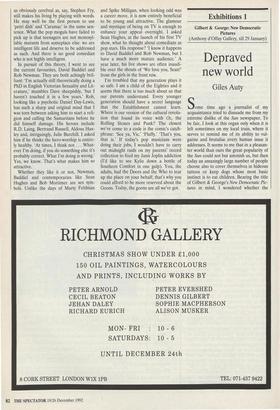Comedy
'See ya Vic'
Teenagers are deserting pop stars for comedians. Emma Forrest explains why Young girls screamed and threw under- wear when Rik Mayall appeared at the National Theatre. They were similarly moved by Hugh Laurie in Gasping and now Tony Slattery in Radio Times. The anarchic surrealist Vic Reeves packed the Hammer- smith Odeon (previously only a music venue) for nine nights. Rob Newman and David Baddiel of The Mary Whitehouse Experience were doing the same this week.
As a 15-year-old comedy enthusiast, I
find myself wondering what it is about these new superstars that evokes the kind of passion formerly reserved for the likes of the Beatles, Marc Bolan and Bros. Although my heroes have always been comics, ranging from Lenny Bruce to Peter Cook, via W.C. Fields and Sid Caesar, I doubt I would queue for three hours in the rain on a Saturday to get a book signed by them. So why did I do just that for an ex- pig farmer who calls himself Vic Reeves? Why have Rob and David claimed the Smash Hits and Just Seventeen centrefolds that used to be Jason Donovan territory?
Teenagers like energy, surprise and something to share, and it's easier to share the jokes than the songs. With television being part of every teenager's after-school ritual, you meet the next morning shouting the latest catch-phrase. If you've got it, you're in the group. If not, you're out of a 20-minute conversation. As for the unex- pected, today's music technology has put paid to that. There is no such thing as a 'live' pop performance: what pretends to be spontaneous looks rigged. Where is the danger in miming to a tape? Comedy is our real home — the only place where subver- sion lives. We love the shocks that Kylie Minogue, packaged Madonna or even Axel Rose, with his scripted violence, have failed to provide. We are weary of inane lyrics — we want issues and words. And language is the basis of comedy. Vic Reeves, whilst not as obviously cerebral as, say, Stephen Fry, still makes his living by playing with words. He may well be the first person to use `petri dish' and `Caramac' in the same sen- tence. What the pop moguls have failed to pick up is that teenagers are not monosyl- labic mutants from someplace else: we are intelligent life and deserve to be addressed as such. And there is no good comedian who is not highly intelligent.
In pursuit of this theory, I went to see the current favourites, David Baddiel and Rob Newman. They are both achingly bril- liant: 'I'm actually still theoretically doing a PhD in English Victorian Sexuality and Lit- erature,' mumbles Dave sheepishly, 'but I haven't touched it in a few years.' Rob, looking like a psychotic Daniel Day-Lewis, has such a sharp and original mind that I was torn between asking him to start a reli- gion and calling the Samaritans before he did himself damage. His heroes include R.D. Laing, Bertrand Russell, Aldous Hux- ley and, intriguingly, Julie Burchill. I asked him if he thinks the hero-worship is entire- ly healthy. 'At times, I think not . . . What- ever I'm doing, if you do something else it's probably correct. What I'm doing is wrong.' Yes, we know. That's what makes him so attractive.
Whether they like it or not, Newman, Baddiel and contemporaries like Sean Hughes and Bob Mortimer are sex sym- bols. Unlike the days of Marty Feldman and Spike Milligan, when looking odd was a career move, it is now entirely beneficial to be young and attractive. The glamour and mystique of being on TV is enough to enhance your appeal overnight. I asked Sean Hughes, at the launch of his first TV show, what he thought about comedians as pop stars. His response? 'I know it happens to David Baddiel and Rob Newman, but I have a much more mature audience.' A year later, his live shows are often inaudi- ble over the shouts of 'We love you, Sean!' from the girls in the front row.
I'm troubled that my generation plays it so safe. I am a child of the Eighties and it seems that there is too much about us that our parents understand. Every younger generation should have a secret language that the Establishment cannot learn. Where is our version of the cultural revolu- tion that found its voice with Oz, the Rolling Stones and Punk? The closest we've come to a code is the comic's catch- phrase: 'See ya, Vic.' Fluffy."That's you, that is.' If today's pop musicians were doing their jobs, I wouldn't have to carry out midnight raids on my parents' record collection to feed my Janis Joplin addiction (I'd like to see Kylie down a bottle of Southern Comfort in one gulp). You, the adults, had the Doors and the Who to tear up the place on your behalf; that's why you could afford to be more reserved about the Goons. Today, the goons are all we've got.











































































































 Previous page
Previous page